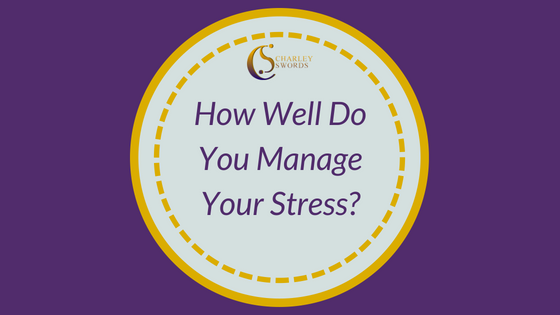Do you turn into an almost different person when you are stressed? If so, you are not alone! Stress is an all too common problem and when you are in a management role and you go from being calm and reasonable to being agitated and unreasonable, it can really impact on your ability to manage productively.

Stress is a persistent management problem, and much has been written about it. Still, it is a recurring theme in my work with clients and I would like to share some techniques which have proven successful in managing stress, both in my management career and in the careers of many of my clients.
Do you find stress exceeds your ability to cope?
Stress isn’t always bad. A little bit of stress can help you stay focused, energetic, and able to meet new challenges at work. But in today’s hectic world, the workplace too often seems like an emotional roller coaster. Long hours, tight deadlines, and ever-increasing demands can leave you feeling worried, drained, and overwhelmed. And when stress exceeds your ability to cope, it stops being helpful and starts causing damage to your mind and body—as well as to your job satisfaction.
Stress impacts both physically and emotionally and wishing it away, simply doesn’t work.
Managing your stress and finding ways to reduce it is important and I would like to share some tips and techniques with you to help you achieve this.
- Step Back and Put the Problem in Perspective
Maybe you’re disappointed that you didn’t get a promotion you were up for or concerned that the project you are working on is running over time. Feeling stressed is a natural reaction. But try to step back, take a deep breath and ask yourself: Will this issue still matter in 6 or 12 months’ time? Put the problem into perspective and look towards finding a solution.
- List Some Solutions and Prepare a Plan
If there’s a specific problem you need to fix, make a list of all possible solutions and pick the best one for your situation. Realizing that you have options and preparing a concrete plan will have a direct effect on reducing your stress. Break the task into smaller parts so you can try to accomplish what you need to in an hour, a day and then next week so the problem becomes more manageable.
- Accept Those Things Beyond Your Control
Some circumstances are simply beyond our control, and we have to learn to cope with and accept them. Fortunately, you do have control over how you react to stressful situations. Staying calm, acknowledging your stress and being willing to accept emotional support from others will help significantly.
- Take a Break to Relax and Recharge
Daily stressors can creep up on you before you realize it, so treat yourself to at least one relaxing activity every day. Listening to music, meditating, writing in a journal, or enjoying a nice long walk are all great ways to relax and relieve stress. Taking time for yourself, even if it is only 15 minutes a day, is important for both preventing and managing stress.
- Try to Get Some Regular Exercise
Exercise is a proven de-stressor because it can relieve both the physical and emotional effects of stress. Consider fitness choices that suit your lifestyle, age and level of fitness and which also deliver specific stress-reducing effects like yoga, tai chi, pilates, running, swimming or a more energetic sport like squash, football etc.
- Improve the Quality of Your Sleep
Skimping on sleep interferes with your daytime productivity, creativity, problem-solving skills, and ability to focus. Make healthy changes to your nightly routine and make adjustments to your sleep environment. Aim for eight hours sleep a night—the amount of sleep most adults need to operate at their best. Turn off screens one hour before bedtime. The light emitted from TV, tablets, smartphones, and computers suppresses your body’s production of melatonin and can severely disrupt your sleep.
- Express Your Feelings
If something’s bothering you, don’t keep it to yourself. Talk to people you trust, like colleagues, peers, friends or family about what’s on your mind. Even if you’re not looking for specific advice, it usually feels good just to talk things through.
- Set Reasonable Expectations
Being busy is sometimes inevitable, but regularly taking on more than you can manage will have adverse effects. You are not obliged to accept every request made of you and you will need to learn to say ‘No!’ You need to set reasonable expectations of yourself and more importantly, of your employees.
- Resolve Issues Before They Become Crises
It’s human nature to avoid unpleasant topics and circumstances, but if you’re concerned about a developing situation, address it early to keep it from becoming more serious, harder to solve, and more stressful for you. Problems are always easier to handle before they develop into full-blown crises.
If any of your employees suffer from work-related stress, it can result in lower productivity, lost workdays, and a higher turnover of staff. As a manager, supervisor or employer the most important thing to do to reduce work-related stress is to act as a positive role model. If you can remain calm in stressful situations, it’s much easier for your employees to follow suit.
Did you find this helpful?
Let me know what you think about this post in the comments box below and also if there are any specific topics you would like me to cover in the future for you!
And, if you would like to speak with me about your own delegation needs or indeed any other area you feel you would like support with, just schedule a free consultation call with me.


